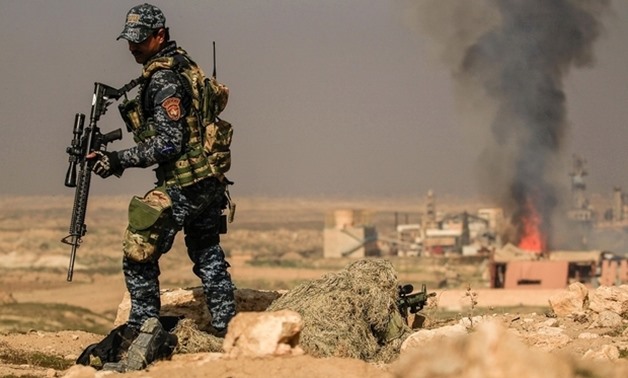
An Iraqi soldier guards a sniper on watch in western Mosul February 23 – REUTERS
CAIRO – 13 July 2017: The defeats of the Islamic State (IS) terrorist group in Syria and Iraq have started since 2014, the same year the group rose into prominence seizing large territories in both countries ending by the death of the group’s leader Abu Bakr al-Baghdadi.
The fights have been launched by Iraqi army, Syrian national army, the international coalition led by the United States, and Russian forces in Syria.
The following is a timeline of IS defeats beginning in 2014.
August 2014: Iraqi security forces and Shiite militiamen liberated the northern Shiite Turkmen town of Amirli in Iraq.
August 2014: Mosul Dam, Iraq’s largest dam was recaptured by Kurdish Peshmerga Forces and Iraqi troops.
September 2014: IS militants fled Suq Al Ghazi after U.S. airstrikes.
October 2014: Zumar town in Iraq was captured by Kurdish Peshmerga Forces following several airstrikes by the U.S.-led coalition.
October 2014: Iraqi town Jurf Al-Sakhar was taken back by Iraqi forces aided by international coalition airstrikes.
November 2014: One month after IS occupation, the Syrian National Defense Forces regained the Shaer Gas Field located east of the central city of Homs.
December 2014: The siege on Mount Sinjar came to an end with Peshmerga forces re-establishing control over the Iraqi town of Sinjar backed by international coalition air strikes.
December 2014: Peshmerga Forces retook the Khabazz Crude Oil Field near the northern Iraqi city of Kirkuk.
January 2015: Ayn al-Arab (Kobani) city in Aleppo governorate of northern Syria was liberated by Kurdish Peshmerga Forces.
January 2015: International coalition airstrikes led to Kurdish Peshmerga Forces acquiring a 300-square-mile area of northern Iraq, cutting one of the key supply lines for IS.
January 2015: Peshmerga Forces seized villages and a key highway intersection encircling Mosul on three sides.
January 2015: Peshmerga Forces took back a small crude oil station near the northern Iraqi city of Kirkuk.
March 2015: Iraqi forces recovered the western town of Al-Baghdadi and the city of Tikrit, which lies between Mosul and the capital, Baghdad.
April 2015: Iraqi security forces captured the northern Iraqi town known for oil refinery, Baji.
April 2015: The Syrian national army captured 21 villages from IS in the south of Al-Qamishli District of the Al-Hasakah Governorate.
April 2015: The Iraqi army seized the old road of Karmah, a city located nearly 20 kilometers northwest of Fallujah, in addition to three villages north of the city, according to Al-Bawaba news.
July 2015: Peshmerga Forces captured the town of Sarrin from IS near the Euphrates river in Iraq.
November 2015: The Syrian national army ended the siege on Kuweires Military Airbase in Syria by capturing the Kaskays village.
May 2015: Peshmerga Forces regained control over many areas of Mount Abdulaziz, one of the jihadists’ strongholds in this corner of north-east Syria, defeating 1,000 militants.
December 2015: The Syrian national army took back the town of Maheen in Homs governorate’s eastern countryside, causing 60 IS militant casualties.
March 2016: Iraqi forces succeeded in recovering several villages in Samarra’s western countryside, aided by popular committees.
March 2016: After facing defeat by the Iraqi army, IS retreated from the desert town of Al-Rutbah in the western Iraqi province of Anbar.
April 2016: After nearly eight months of being under IS control the eastern Syrian town of Al-Qaryatayn was re-seized by the Syrian national army.
May 2016: The Iraqi army regained full control over Fallujah city near Baghdad.
June 2016: The Syrian Armed Forces recaptured the town of Arak, lying on the strategic M20 highway between Palmyra and Deir Ezzor.
June 2016: The Iraqi Air Force and International Coalition collaborated to destroy dozens of IS vehicles and the killing of hundreds of the group’s militants through targeted airstrikes of convoys.
July 2016: The Iraqi Army liberated Al-Dolab town in Anbar province killing 73 militants.
August 2016: Ramadi city, the capital of Al Anbar governorate, came under the control of the Iraqi army.
August 2016: The international coalition conducted air strikes that resulted in more than 83 oil tankers controlled by IS to fund their terrorist operations being depleted.
December 2016: The Syrian city of Aleppo was fully liberated by the Syrian armed forces that were backed by a military coalition with Russia.
March 2017: The ancient Syrian city of Palmyra was liberated by national armed forces backed by the Russian Air Force.
March 2017: Syrian Armed Forces aided by Russian airstrikes liberated Palmyra from 4,000-5,000 IS militants who recaptured it in December 2016.
June 2017: Syrian Armed Forces recaptured some villages in the Maskanah countryside along the Aleppo-Raqqa axis.
June 2017: Syrian Armed Forces, covered by Russian airstrikes, regained control over the town of Maskana and more than 20 other villages in eastern Aleppo.
On July 10, 2017: Iraqi Prime Minister Haider Al-Abadi announced Mosul, a major city in northern Iraq, free from IS.
Since July 4, 2017: The old city of Raqqa has been under siege, while the Rafiqah Wall stretching around the city on three sides was breached by U.S.-backed troops.
Since March 2017: Syrian Armed Forces have been advancing in the area of Deir Ezzour as several villages and highways have been freed from IS militants in the countryside surrounding the northern Syria city.
A major defeat of IS is the death of its leader called by the group caliphate, Baghdadi. Baghdadi was announced dead on July 11 by the London-based the Syrian Observatory for Human Rights.
The news was also confirmed by a Syrian leader in the group based in the eastern countryside of Deir Ezzor, according to Reuters.
Baghdadi has been missing for weeks after the Russian Defense Minister Sergei Ivanov’s statement in June that he might be killed in air strikes by Russian Air Force on the outskirts of the Syrian city of Raqqa.

Comments
Leave a Comment